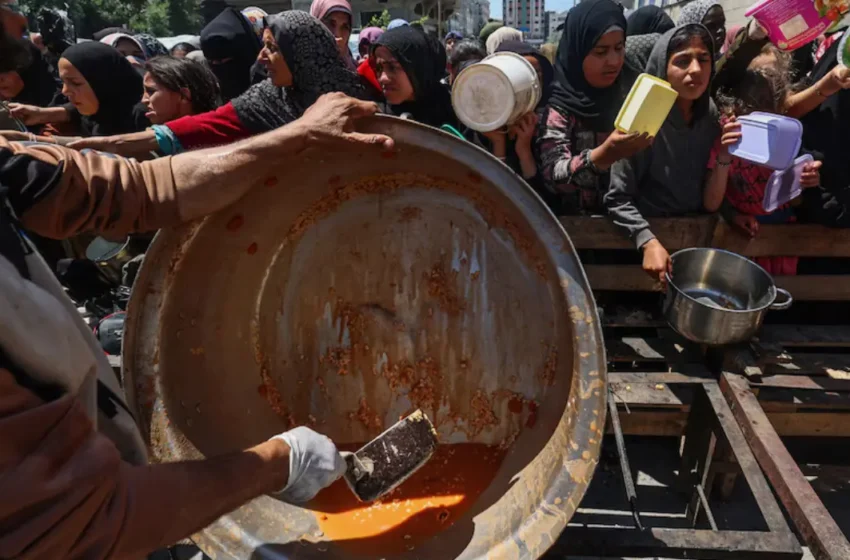
U.S. Pressures U.N., allies to back Israel’s controversial Gaza aid plan
According to aid officials and others familiar with internal discussions, the Trump administration is pressuring the United Nations, aid organizations, and U.S. allies to join a new Israeli plan to resume distributing limited amounts of humanitarian aid in Gaza under strict Israeli control. All people in need during a conflict must receive humanitarian relief in an unbiased and discrimination-free manner, according to international law, particularly the Geneva Conventions.
The United Nations and almost every other body have declined to take part in a scheme that they have characterized as going against “fundamental humanitarian principles” and breaking international law, which is why the United States is making this attempt.
In a briefing paper distributed to assistance partners during the past 24 hours, the office of the U.N. coordinator for humanitarian affairs formally declared that stance. It stated that they had all “decided not to participate in this modality after careful consideration, consultation, and analysis.”
Israel responded harshly to the comments. “Instead of having a dialogue with us or trying to understand what is the proposal… the U.N. decided to put out a statement that they will not engage,” Israel’s ambassador to the U.N., Danny Danon, told reporters Wednesday.
At the U.S. mission to the United Nations on Wednesday, Steve Witkoff, President Donald Trump’s Mideast envoy, met with U.N. Security Council members to discuss the Gaza proposal. In recent days, the administration has met many times with assistance groups that have been working on relief efforts in Gaza. Another set of assistance groups located in Europe has been invited to a meeting with U.S. officials in Geneva on Thursday, aid officials said.
Next week, Trump, who promised to settle the Gaza situation quickly during his campaign, will visit Saudi Arabia, Qatar, and the United Arab Emirates. He informed reporters on Wednesday that a significant statement about Gaza will likely be made “within the next 24 hours.”
Following the breakdown of a short truce in March, Israel imposed a blockade on Gaza. For two months, no supplies, including food, have been permitted to enter the enclave. A restricted number of commodities would be examined by Israel and permitted to move along specified routes to distribution centers built by Israel under its recently developed plan. Private U.S. security companies are to guard the hubs and the corridors.
Food packets will be distributed to Israeli-vetted Palestinians at the hubs by humanitarian nongovernmental groups already operating in Gaza and the United Nations, including the U.N. World Food Program.
The program will be run by the Gaza Humanitarian Foundation, a nonprofit organization recently registered in Switzerland that was established by unidentified governments and entities to provide funding for the project, including paying the American security contractors.
The Geneva-based group released a statement on Wednesday that had no details on its history, supporters, or connection to Israel. Through an impartial, thoroughly verified mechanism that provides aid directly — and exclusively — to individuals in need, GHF was founded to restore that crucial lifeline.
People acquainted with the Israeli preparations and nongovernmental relief groups claimed the scope and circumstances outlined were very different from what they had been told about the plan’s early phases, which would feed less than 200,000 people and screen participation.
Only southern Gaza will receive aid, as a new Israeli military strategy approved over the weekend by Prime Minister Benjamin Netanyahu’s security cabinet calls for the relocation of the majority of Gaza’s population of over 2 million people as it intensifies operations against what it claims are Hamas militants still active in the enclave.
According to someone with knowledge of Israeli preparations, “it’s not a trial run.” “The population will eventually settle there.” Several assistance groups have ceased operations in Gaza as food stocks have been emptying over the past few weeks, and reports of acute hunger have increased.
The Washington-based charity World Central Kitchen (WCK), led by chef José Andrés, who is well-known around the world, declared on Wednesday that it “no longer has the supplies to cook meals and bake bread in Gaza.” Since early March, WCK’s trucks have been prepared at the Gazan border, laden with food and cooking fuel, but “our vital work cannot continue without permission from Israel for this aid to enter,” the organization stated.
WCK joined the United Nations and other organizations in refusing to participate in the Israeli proposal, Chief Executive Officer Erin Gore stated in an interview on Wednesday. “It violates our humanitarian values,” Gore stated. “We are unable to eat with dignity because of it.” According to a senior WCK official, the Trump administration was informed of that stance during talks with the State Department.


